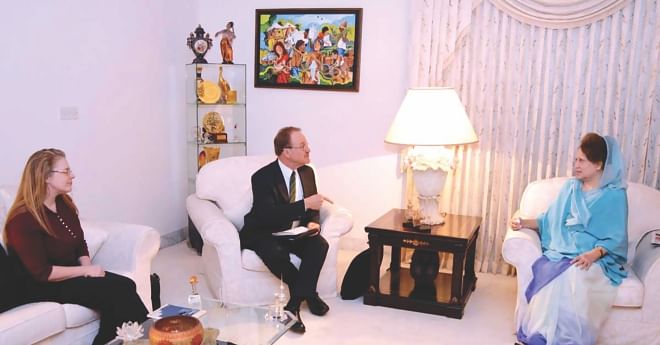US, UK move to break deadlock
US, UK move to break deadlock

Undeterred by the international community's recent failure to break the political deadlock, the USA and the UK have made fresh moves to bring the ruling Awami League and the opposition BNP to the negotiating table.
With the one-sided January 5 polls only a few days away, the latest diplomatic efforts aim at convincing the two parties to soften their stances in order to prevent Bangladesh from slipping into a deeper crisis.
As part of the moves, British High Commissioner Robert Gibson called on BNP Chairperson Khaleda Zia on Monday and AL General Secretary Syed Ashraful Islam yesterday, while US Ambassador Dan Mozena met the BNP chief yesterday afternoon.
But so far, there have been no signs of progress.
Khaleda told the British and US envoys that the stifling situation could end only through a cancellation of the January 5 election and the holding of a free, inclusive and credible election under a non-partisan polls-time government, said sources in the BNP.
On the other hand, the AL told the British diplomat that the January 5 polls must be held first, and then it could sit with the BNP to decide on the next course of action, according to sources in the AL.
The meetings took place amid rising tensions over the opposition's “march for democracy”, which was foiled by the government on Sunday and Monday. The BNP-led 18-party combine, meanwhile, has announced a non-stop blockade of road, rail and waterways from today morning.
Though both the USA and the UK were well aware of the rigid stances of the ruling and opposition parties, they wanted to give it another try to resolve the deadlock, said diplomatic sources.
The foreign diplomats in Dhaka, who remained silent following UN envoy Oscar Fernandez-Taranco's failure to break the ice between the two rival camps, are concerned over the recent political developments.
Meanwhile, the US has once again expressed disappointment at the absence of a political consensus on the holding of a credible election in Bangladesh.
“We believe it's more urgent than ever for the major parties to redouble their efforts to engage in constructive dialogue to find a way forward to holding free and fair elections that are credible and reflecting the will of the Bangladeshi people,” Marie Harf, deputy spokesperson of the US Department of State, said at a press briefing in Washington DC on December 30.
“We are disappointed that the major political parties have not yet reached a consensus on a way to hold free, fair, and credible elections.”
The USA is prepared to reengage its efforts and in particular its observation efforts at a later time if there is a more conducive environment, she said. “But we are disappointed that so far they haven't done so.”
On the escalation of violence in Bangladesh, Harf said, “As we have said repeatedly, violence is not acceptable for a number of reasons, but in part because it subverts the democratic process. And we've called on it to stop immediately.”
“That's certainly our position. We know there's a lot of work still to be done there, but hopefully we can see some progress being made.”
Replying to a query whether the US State Department had made any phone calls to Bangladesh's political leaders, Harf said, “I am sure some phone calls have been made from this building. I am happy to check and see what our outreach has looked like.”
When Harf was asked if the US supported the BNP-led opposition's demand for a non-partisan polls-time government, she refrained from giving any clear answer.
“I haven't -- I quite frankly haven't seen those reports. I am happy to see if there's a response from our team.”
In Dhaka, US Ambassador Dan Mozena has voiced concern over the arrests of senior opposition leaders and called for ensuring political space for the opposition and avoiding the path of violence.
He made the call in a statement after meeting Khaleda at the latter's Gulshan residence yesterday afternoon.
The US ambassador and the opposition leader discussed the democratic process in Bangladesh, the government's responsibility to provide political space to the opposition, and also the opposition's responsibility to use this space peacefully.
The ambassador noted that Sunday's incidents at the Supreme Court, Jatiya Press Club and Dhaka University were disturbing, as they were contrary to the democratic process and must not be allowed to recur, US Embassy Spokesperson Kelly S McCarthy told The Daily Star.
Mozena urged all parties to put a stop to violence, saying it was unacceptable and not consistent with the democratic process.
He also underscored the need for the parties to engage in serious dialogue immediately to find a way forward to the holding of a free, fair and credible election.
McCarthy said that the ambassador also noted the US government's concern at the arrests of senior political leaders, given the intimidating effect it has on those who wish to peacefully exercise their democratic rights and whose participation is critical for the success of future dialogue between the two sides.
Earlier, British High Commissioner Robert Gibson held an hour-long meeting with AL General Secretary Syed Ashraful Islam at his minister's residence.
The British envoy emphasised the need for the ruling party to engage in dialogue with the main opposition party to bring an end to the current political deadlock.
In response, Ashraf said let the election would be held on January 5 and then they would have further dialogue with the BNP, said sources in the AL.
The diplomat told Ashraf that when he went to meet the BNP chief at her residence on Monday he noticed that Khaleda was virtually confined to her house.
In reply, Ashraf said it was the BNP chairperson who kept people confined by calling the non-stop blockade, said the sources.
Neither Gibson nor Ashraf talked to the press after the meeting. Gibson also made no comments on his meeting with Khaleda.